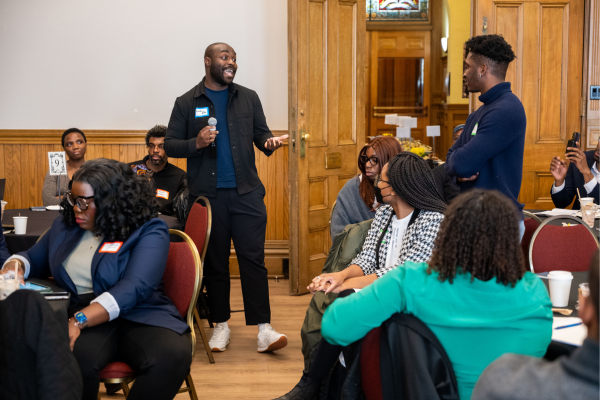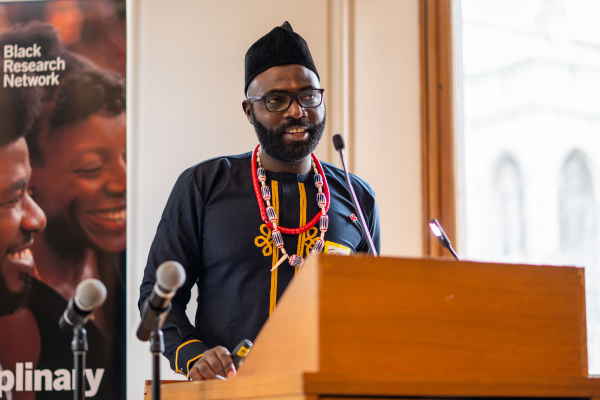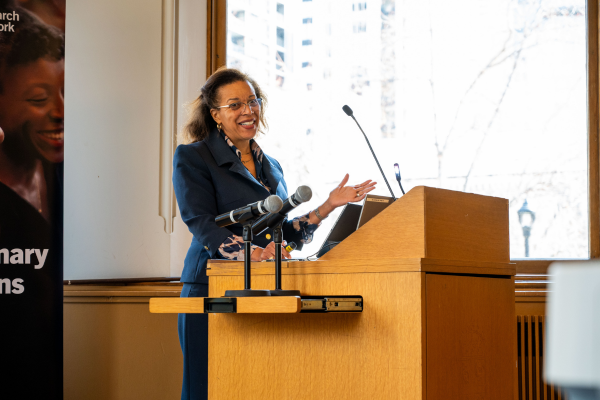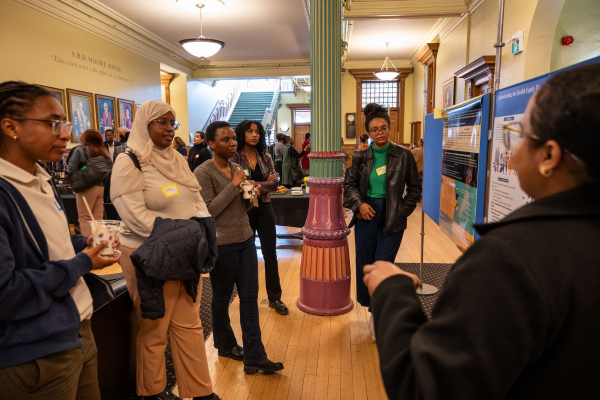Black Research Network’s first symposium boosts cross-disciplinary research collaborations and mentorship


The Black Research Network (BRN) hosted its inaugural BRN Research Symposium on April 14 at Victoria University in the University of Toronto, bringing together faculty, students, staff and university leaders to celebrate research across disciplines.
“This gathering is an important space for celebrating the depth, diversity and impact of Black scholarship,” said Kola Ijasan, BRN program lead. “It is also a space of connection; where research meets community, where emerging scholars engage with established voices, and where shared inquiry leads to collective action.”
Keynote speakers included Jude Kong, an assistant professor at the Dalla Lana School of Public Health, who presented a talk titled “AI as a Public Good: Strengthening Public Health Systems — Past, Present, and Future,” and Notisha Massaquoi, whose keynote, “Hands Wash Each Other: Building a Transformative Health Research Practice to Support Black Communities,” emphasized community-driven approaches to health equity research.

Timothy Bryan, an assistant professor in the department of sociology at U of T Mississauga, shared findings from his BRN IGNITE grant-funded project, which explores perceptions of street safety and policing in Halifax, Nova Scotia. Mirielle Norris, an associate professor and Black Health lead at the Temerty Faculty of Medicine and inaugural BRN Faculty Fellow, discussed her efforts to address structural health disparities and the social determinants of health in Black communities.
Norris leads the Community Hypertension Outcomes Improvement by Computerized Education Seminars (CHOICES) project, which provides Afrocentric nutrition education to Black individuals with hypertension. Funded by a BRN IGNITE grant, the project has reached 20 participants – 80 per cent of whom had never received dietary counselling for hypertension.

With a focus on mentorship and increasing the representation and retention of Black and Indigenous medical students at Sunnybrook Hospital and U of T, Norris is leading efforts for a more inclusive and accountable healthcare system.
“Systemic change is not theoretical; it’s something we can scale when we’re supported,” Norris said. “We’re united in a common purpose – to imagine a future where Black health and equity are not checkboxes, but commitments, and where care is led by us.”
Watch: BRN Faculty Fellows discuss the power of mentorship
The symposium featured a series of rapid-fire rocket pitches, where attendees shared their projects in brief, impactful presentations.
Through the Black Joy Art Initiative, Mercedes Sobers, a PhD candidate at the Dalla Lana School of Public Health, has curated an upcoming exhibition at Hart House to counterbalance her dissertation on mental health care disparities in the Black community. De-Lawrence Lamptey, assistant professor (status only) at the Temerty Faculty of Medicine and inaugural EMBARK Scientist — a role launched in 2022 by Holland Bloorview and the BRN — highlighted his research about the experiences of racialized children and youth with disabilities in Canada, focusing on household food insecurity, mental health and physical well-being.
Kwame Diko, assistant director, equity & outreach in the Office of Student Recruitment, pitched his case study, which explores how ten administrative professionals at Ontario universities experience and make sense of collaboration in their work to highlight the importance of their contributions in enhancing institutional flexibility, innovation, and responsiveness.
Delivered by undergrads and graduate students, poster presentations covered research in public health and the medical sciences to humanities and engineering research.
The symposium also featured a mentorship lunch, the BRN’s first official initiative to build relationships that support Black-identified students, faculty, librarians and staff, foster a sense of belonging and promote future academic excellence. Participants had the opportunity to ask mentors about career advancement and strategies for success.

To support the next generation of researchers, the BRN partnered with the Black Graduate Students’ Association to host “Thriving in Academia,” a workshop led by Adrian Leckie, program lead of the Imani Program at U of T Scarborough. Meanwhile, Danielle Taschereau Mamers, managing director of the Critical Digital Humanities Initiative, led a networking session for faculty and postdoctoral fellows to discuss current and future research.
BRN Director Enid Montague closed the symposium highlighting the importance of recognizing the power of inclusive excellence in advancing research.
“Initiatives like today’s and those led by our colleagues across the tri-campus, truly highlight the power of recognizing and nurturing the brilliance within our community,” said Montague, an associate professor in the Faculty of Applied Science and Engineering.
“To our faculty, your contributions are inspiring future generations to reach new heights. Having the chance to work with and speak to the students, I am confident that the future is incredibly bright.”







